MNG10247 - Analyzing Management Practices: David Jones HR Interview
VerifiedAdded on 2023/04/17
|10
|1385
|222
Report
AI Summary
This report presents an analysis of an interview conducted with a Human Resources Manager at David Jones, focusing on their role and activities within the organization. The interview explores various aspects of the manager's responsibilities, including recruitment, training, employee motivation, and employee relations. Key management theories, such as Frederick Herzberg's motivation-hygiene theory and goal-setting theory, are discussed in relation to the manager's practices. The report also highlights the challenges faced by the manager, such as compliance with organizational legislations and managing changes in management policies. The managerial functions of planning, organizing, leading, coordinating, and controlling are evaluated in comparison with Fayol's management theory. The report concludes by emphasizing the pivotal role of managers in achieving organizational goals and provides recommendations for improving management practices, including staying updated with hiring policies, arranging frequent meetings for policy changes, and practicing democratic leadership.
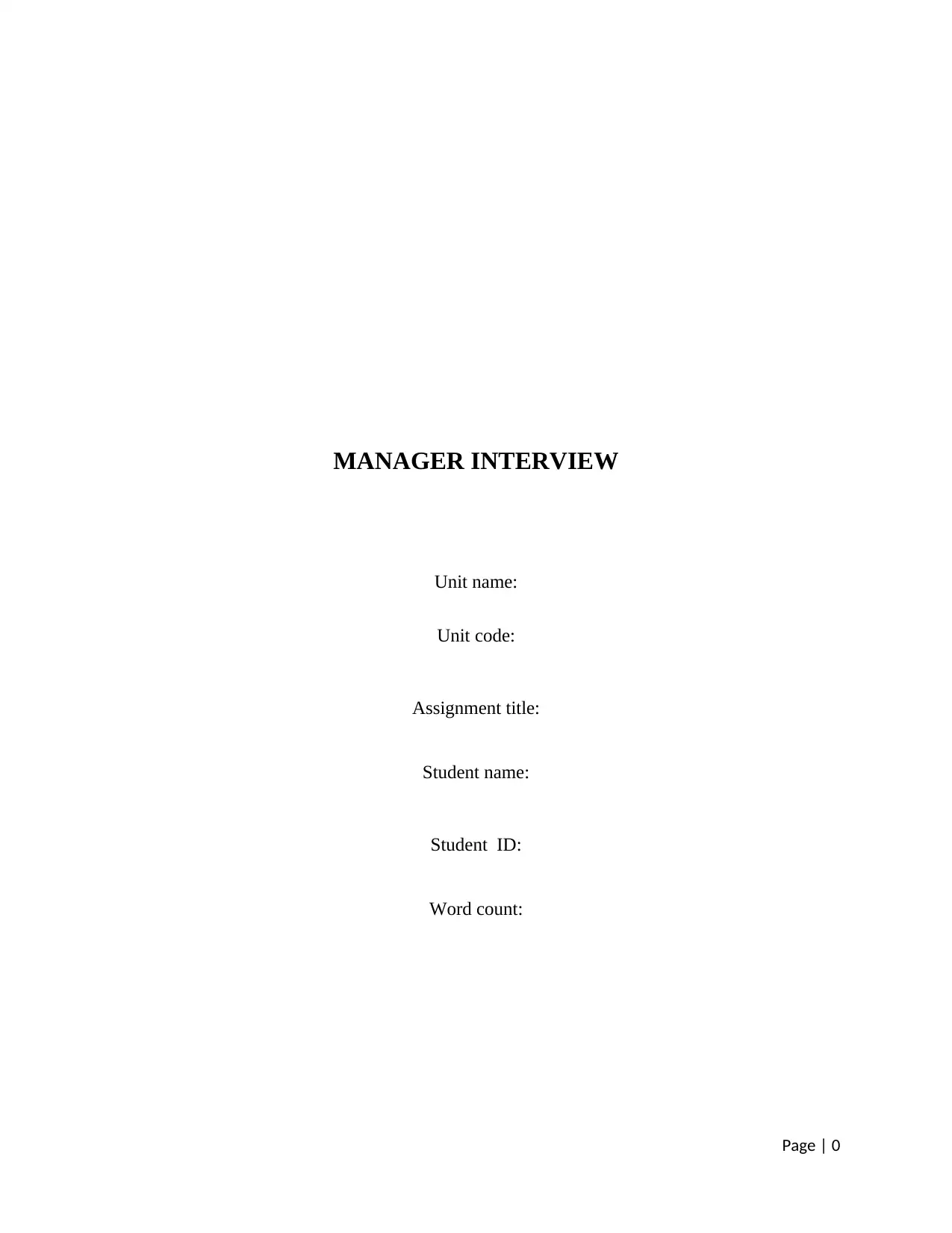
MANAGER INTERVIEW
Unit name:
Unit code:
Assignment title:
Student name:
Student ID:
Word count:
Page | 0
Unit name:
Unit code:
Assignment title:
Student name:
Student ID:
Word count:
Page | 0
Paraphrase This Document
Need a fresh take? Get an instant paraphrase of this document with our AI Paraphraser
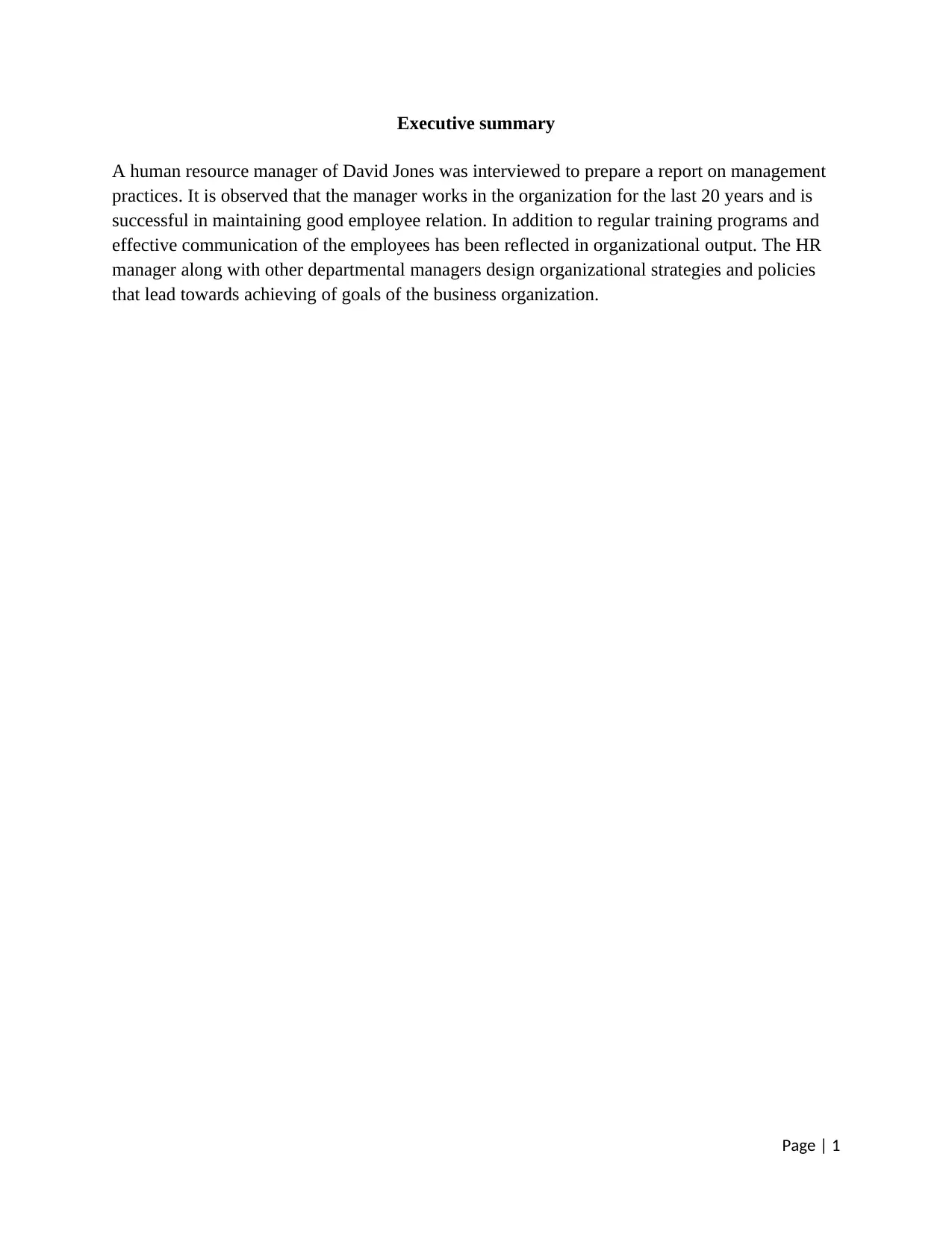
Executive summary
A human resource manager of David Jones was interviewed to prepare a report on management
practices. It is observed that the manager works in the organization for the last 20 years and is
successful in maintaining good employee relation. In addition to regular training programs and
effective communication of the employees has been reflected in organizational output. The HR
manager along with other departmental managers design organizational strategies and policies
that lead towards achieving of goals of the business organization.
Page | 1
A human resource manager of David Jones was interviewed to prepare a report on management
practices. It is observed that the manager works in the organization for the last 20 years and is
successful in maintaining good employee relation. In addition to regular training programs and
effective communication of the employees has been reflected in organizational output. The HR
manager along with other departmental managers design organizational strategies and policies
that lead towards achieving of goals of the business organization.
Page | 1
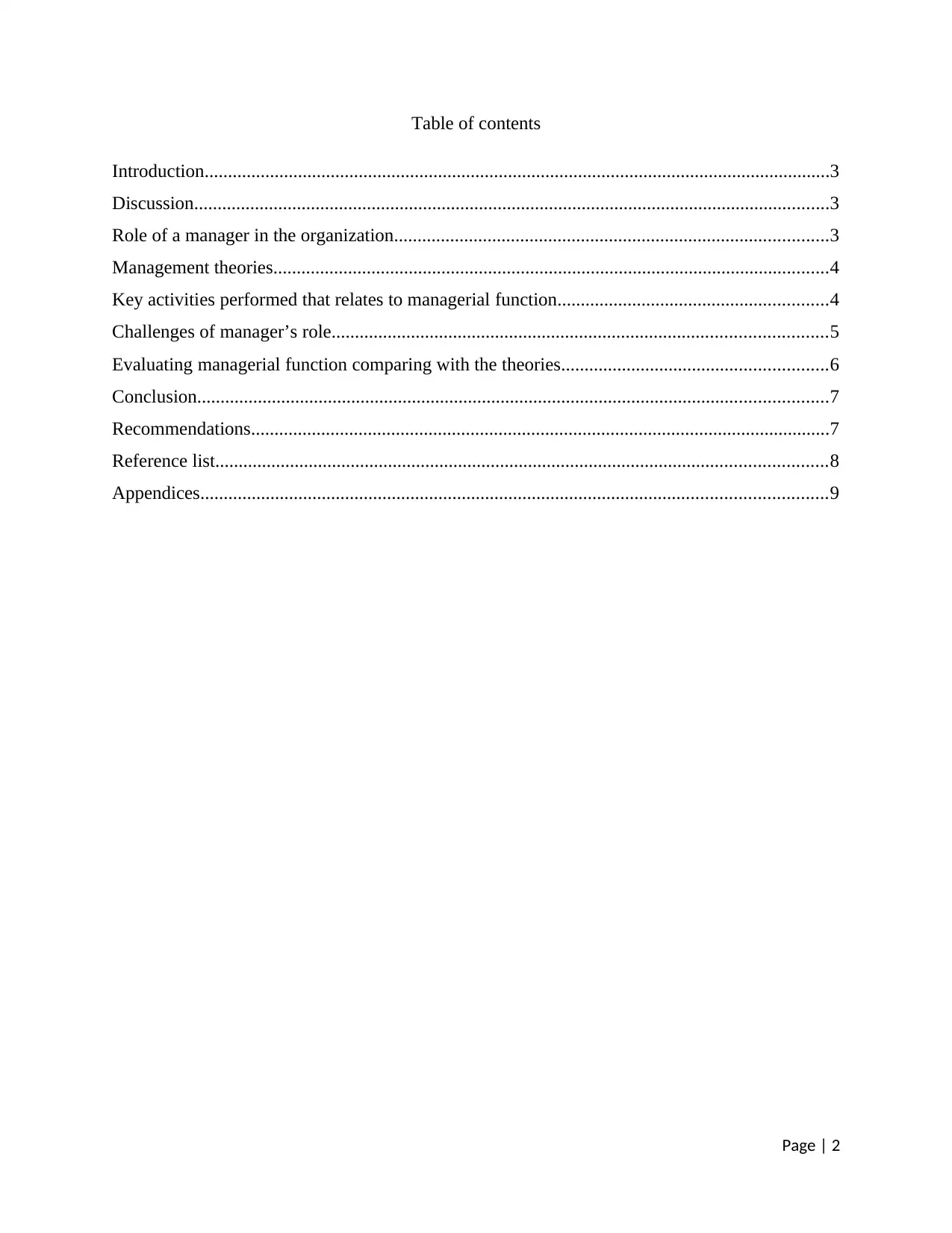
Table of contents
Introduction......................................................................................................................................3
Discussion........................................................................................................................................3
Role of a manager in the organization.............................................................................................3
Management theories.......................................................................................................................4
Key activities performed that relates to managerial function..........................................................4
Challenges of manager’s role..........................................................................................................5
Evaluating managerial function comparing with the theories.........................................................6
Conclusion.......................................................................................................................................7
Recommendations............................................................................................................................7
Reference list...................................................................................................................................8
Appendices......................................................................................................................................9
Page | 2
Introduction......................................................................................................................................3
Discussion........................................................................................................................................3
Role of a manager in the organization.............................................................................................3
Management theories.......................................................................................................................4
Key activities performed that relates to managerial function..........................................................4
Challenges of manager’s role..........................................................................................................5
Evaluating managerial function comparing with the theories.........................................................6
Conclusion.......................................................................................................................................7
Recommendations............................................................................................................................7
Reference list...................................................................................................................................8
Appendices......................................................................................................................................9
Page | 2
⊘ This is a preview!⊘
Do you want full access?
Subscribe today to unlock all pages.

Trusted by 1+ million students worldwide
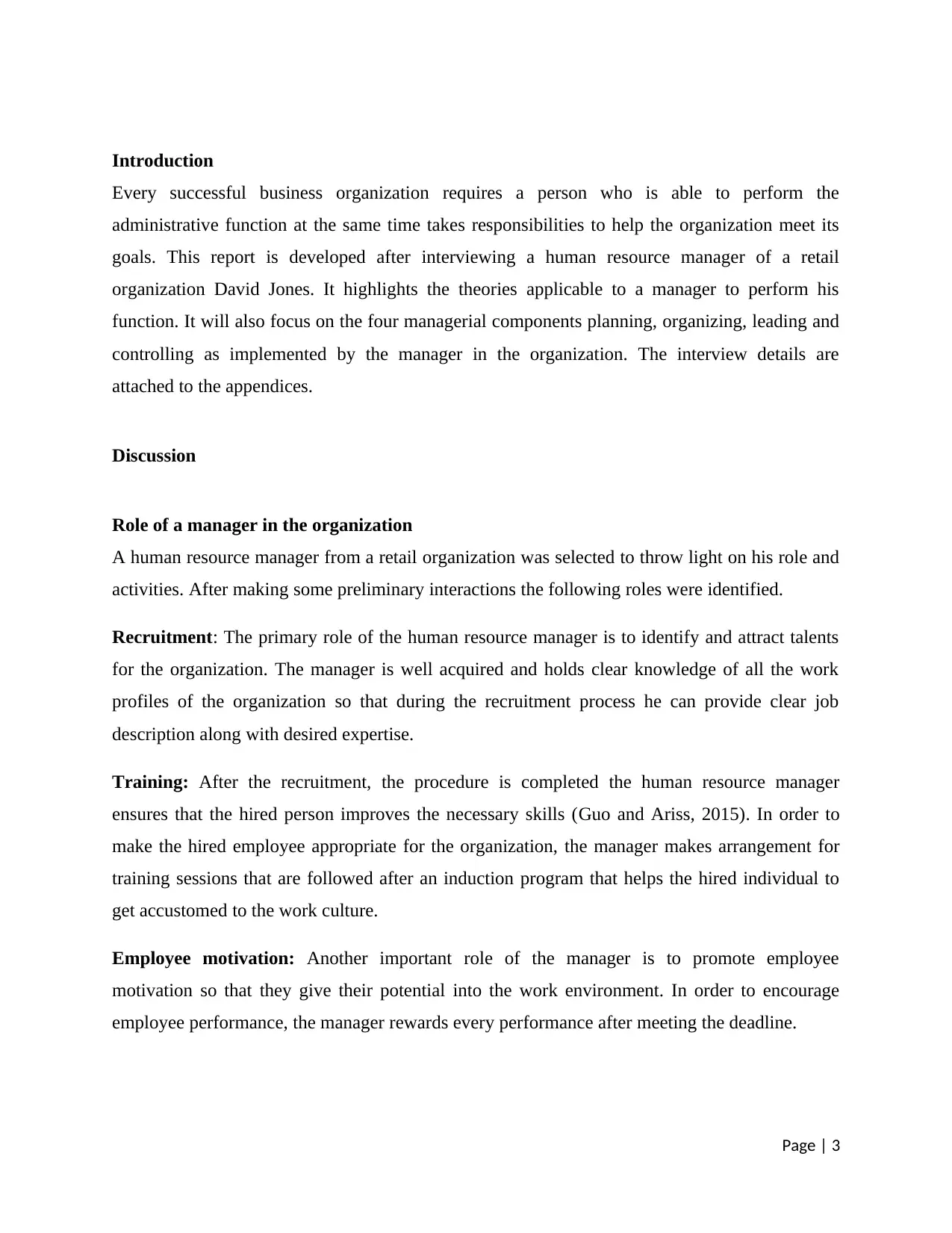
Introduction
Every successful business organization requires a person who is able to perform the
administrative function at the same time takes responsibilities to help the organization meet its
goals. This report is developed after interviewing a human resource manager of a retail
organization David Jones. It highlights the theories applicable to a manager to perform his
function. It will also focus on the four managerial components planning, organizing, leading and
controlling as implemented by the manager in the organization. The interview details are
attached to the appendices.
Discussion
Role of a manager in the organization
A human resource manager from a retail organization was selected to throw light on his role and
activities. After making some preliminary interactions the following roles were identified.
Recruitment: The primary role of the human resource manager is to identify and attract talents
for the organization. The manager is well acquired and holds clear knowledge of all the work
profiles of the organization so that during the recruitment process he can provide clear job
description along with desired expertise.
Training: After the recruitment, the procedure is completed the human resource manager
ensures that the hired person improves the necessary skills (Guo and Ariss, 2015). In order to
make the hired employee appropriate for the organization, the manager makes arrangement for
training sessions that are followed after an induction program that helps the hired individual to
get accustomed to the work culture.
Employee motivation: Another important role of the manager is to promote employee
motivation so that they give their potential into the work environment. In order to encourage
employee performance, the manager rewards every performance after meeting the deadline.
Page | 3
Every successful business organization requires a person who is able to perform the
administrative function at the same time takes responsibilities to help the organization meet its
goals. This report is developed after interviewing a human resource manager of a retail
organization David Jones. It highlights the theories applicable to a manager to perform his
function. It will also focus on the four managerial components planning, organizing, leading and
controlling as implemented by the manager in the organization. The interview details are
attached to the appendices.
Discussion
Role of a manager in the organization
A human resource manager from a retail organization was selected to throw light on his role and
activities. After making some preliminary interactions the following roles were identified.
Recruitment: The primary role of the human resource manager is to identify and attract talents
for the organization. The manager is well acquired and holds clear knowledge of all the work
profiles of the organization so that during the recruitment process he can provide clear job
description along with desired expertise.
Training: After the recruitment, the procedure is completed the human resource manager
ensures that the hired person improves the necessary skills (Guo and Ariss, 2015). In order to
make the hired employee appropriate for the organization, the manager makes arrangement for
training sessions that are followed after an induction program that helps the hired individual to
get accustomed to the work culture.
Employee motivation: Another important role of the manager is to promote employee
motivation so that they give their potential into the work environment. In order to encourage
employee performance, the manager rewards every performance after meeting the deadline.
Page | 3
Paraphrase This Document
Need a fresh take? Get an instant paraphrase of this document with our AI Paraphraser
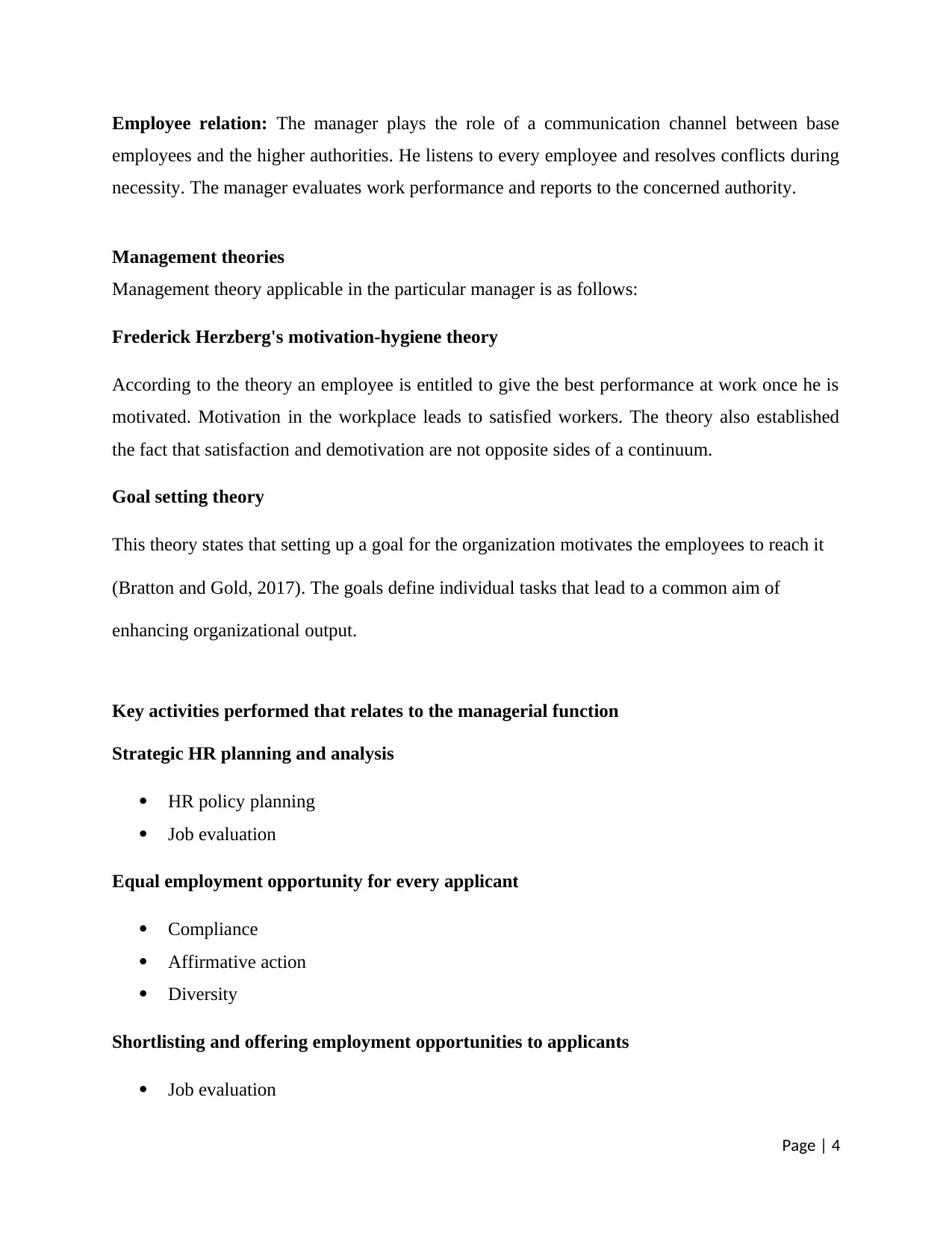
Employee relation: The manager plays the role of a communication channel between base
employees and the higher authorities. He listens to every employee and resolves conflicts during
necessity. The manager evaluates work performance and reports to the concerned authority.
Management theories
Management theory applicable in the particular manager is as follows:
Frederick Herzberg's motivation-hygiene theory
According to the theory an employee is entitled to give the best performance at work once he is
motivated. Motivation in the workplace leads to satisfied workers. The theory also established
the fact that satisfaction and demotivation are not opposite sides of a continuum.
Goal setting theory
This theory states that setting up a goal for the organization motivates the employees to reach it
(Bratton and Gold, 2017). The goals define individual tasks that lead to a common aim of
enhancing organizational output.
Key activities performed that relates to the managerial function
Strategic HR planning and analysis
HR policy planning
Job evaluation
Equal employment opportunity for every applicant
Compliance
Affirmative action
Diversity
Shortlisting and offering employment opportunities to applicants
Job evaluation
Page | 4
employees and the higher authorities. He listens to every employee and resolves conflicts during
necessity. The manager evaluates work performance and reports to the concerned authority.
Management theories
Management theory applicable in the particular manager is as follows:
Frederick Herzberg's motivation-hygiene theory
According to the theory an employee is entitled to give the best performance at work once he is
motivated. Motivation in the workplace leads to satisfied workers. The theory also established
the fact that satisfaction and demotivation are not opposite sides of a continuum.
Goal setting theory
This theory states that setting up a goal for the organization motivates the employees to reach it
(Bratton and Gold, 2017). The goals define individual tasks that lead to a common aim of
enhancing organizational output.
Key activities performed that relates to the managerial function
Strategic HR planning and analysis
HR policy planning
Job evaluation
Equal employment opportunity for every applicant
Compliance
Affirmative action
Diversity
Shortlisting and offering employment opportunities to applicants
Job evaluation
Page | 4
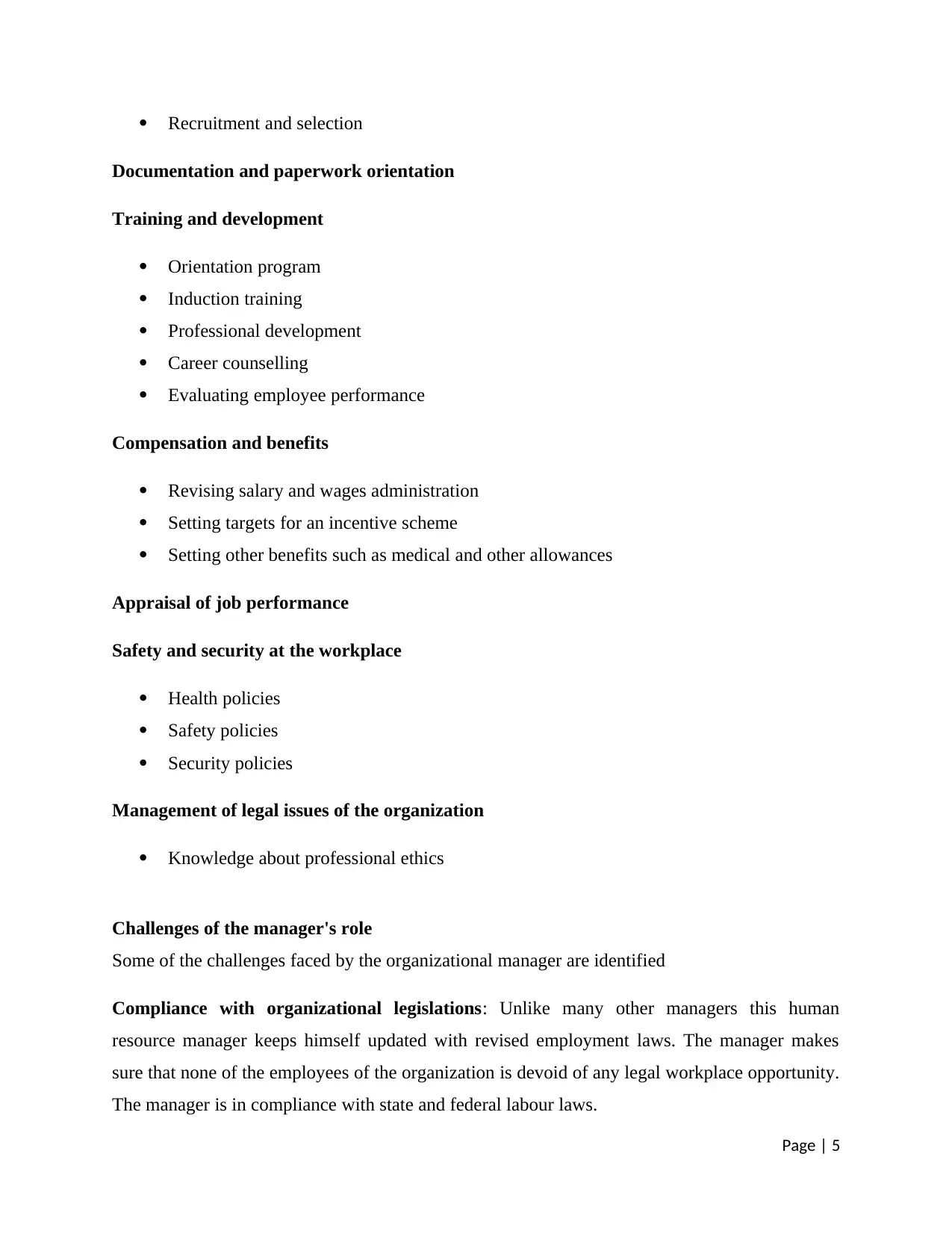
Recruitment and selection
Documentation and paperwork orientation
Training and development
Orientation program
Induction training
Professional development
Career counselling
Evaluating employee performance
Compensation and benefits
Revising salary and wages administration
Setting targets for an incentive scheme
Setting other benefits such as medical and other allowances
Appraisal of job performance
Safety and security at the workplace
Health policies
Safety policies
Security policies
Management of legal issues of the organization
Knowledge about professional ethics
Challenges of the manager's role
Some of the challenges faced by the organizational manager are identified
Compliance with organizational legislations: Unlike many other managers this human
resource manager keeps himself updated with revised employment laws. The manager makes
sure that none of the employees of the organization is devoid of any legal workplace opportunity.
The manager is in compliance with state and federal labour laws.
Page | 5
Documentation and paperwork orientation
Training and development
Orientation program
Induction training
Professional development
Career counselling
Evaluating employee performance
Compensation and benefits
Revising salary and wages administration
Setting targets for an incentive scheme
Setting other benefits such as medical and other allowances
Appraisal of job performance
Safety and security at the workplace
Health policies
Safety policies
Security policies
Management of legal issues of the organization
Knowledge about professional ethics
Challenges of the manager's role
Some of the challenges faced by the organizational manager are identified
Compliance with organizational legislations: Unlike many other managers this human
resource manager keeps himself updated with revised employment laws. The manager makes
sure that none of the employees of the organization is devoid of any legal workplace opportunity.
The manager is in compliance with state and federal labour laws.
Page | 5
⊘ This is a preview!⊘
Do you want full access?
Subscribe today to unlock all pages.

Trusted by 1+ million students worldwide
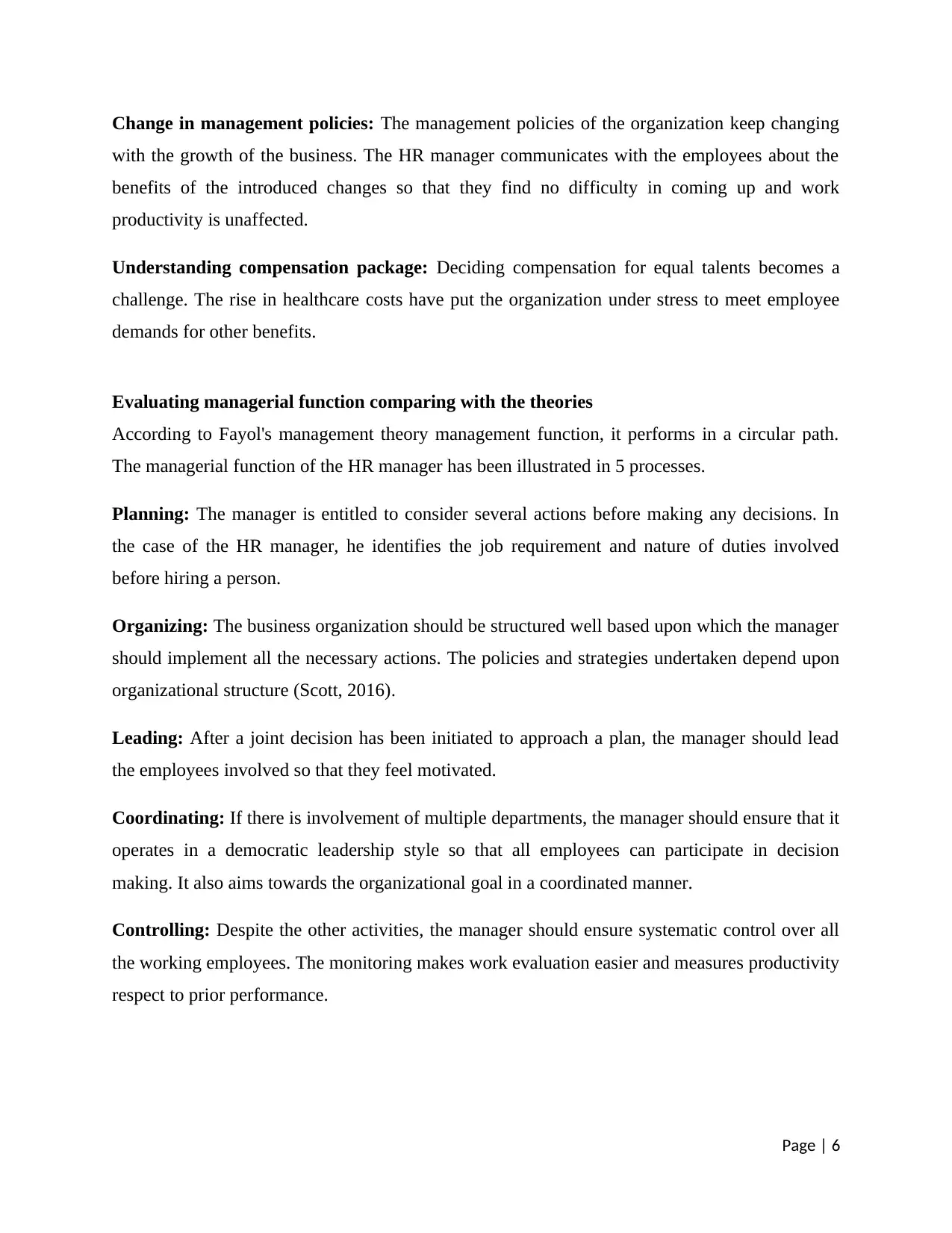
Change in management policies: The management policies of the organization keep changing
with the growth of the business. The HR manager communicates with the employees about the
benefits of the introduced changes so that they find no difficulty in coming up and work
productivity is unaffected.
Understanding compensation package: Deciding compensation for equal talents becomes a
challenge. The rise in healthcare costs have put the organization under stress to meet employee
demands for other benefits.
Evaluating managerial function comparing with the theories
According to Fayol's management theory management function, it performs in a circular path.
The managerial function of the HR manager has been illustrated in 5 processes.
Planning: The manager is entitled to consider several actions before making any decisions. In
the case of the HR manager, he identifies the job requirement and nature of duties involved
before hiring a person.
Organizing: The business organization should be structured well based upon which the manager
should implement all the necessary actions. The policies and strategies undertaken depend upon
organizational structure (Scott, 2016).
Leading: After a joint decision has been initiated to approach a plan, the manager should lead
the employees involved so that they feel motivated.
Coordinating: If there is involvement of multiple departments, the manager should ensure that it
operates in a democratic leadership style so that all employees can participate in decision
making. It also aims towards the organizational goal in a coordinated manner.
Controlling: Despite the other activities, the manager should ensure systematic control over all
the working employees. The monitoring makes work evaluation easier and measures productivity
respect to prior performance.
Page | 6
with the growth of the business. The HR manager communicates with the employees about the
benefits of the introduced changes so that they find no difficulty in coming up and work
productivity is unaffected.
Understanding compensation package: Deciding compensation for equal talents becomes a
challenge. The rise in healthcare costs have put the organization under stress to meet employee
demands for other benefits.
Evaluating managerial function comparing with the theories
According to Fayol's management theory management function, it performs in a circular path.
The managerial function of the HR manager has been illustrated in 5 processes.
Planning: The manager is entitled to consider several actions before making any decisions. In
the case of the HR manager, he identifies the job requirement and nature of duties involved
before hiring a person.
Organizing: The business organization should be structured well based upon which the manager
should implement all the necessary actions. The policies and strategies undertaken depend upon
organizational structure (Scott, 2016).
Leading: After a joint decision has been initiated to approach a plan, the manager should lead
the employees involved so that they feel motivated.
Coordinating: If there is involvement of multiple departments, the manager should ensure that it
operates in a democratic leadership style so that all employees can participate in decision
making. It also aims towards the organizational goal in a coordinated manner.
Controlling: Despite the other activities, the manager should ensure systematic control over all
the working employees. The monitoring makes work evaluation easier and measures productivity
respect to prior performance.
Page | 6
Paraphrase This Document
Need a fresh take? Get an instant paraphrase of this document with our AI Paraphraser
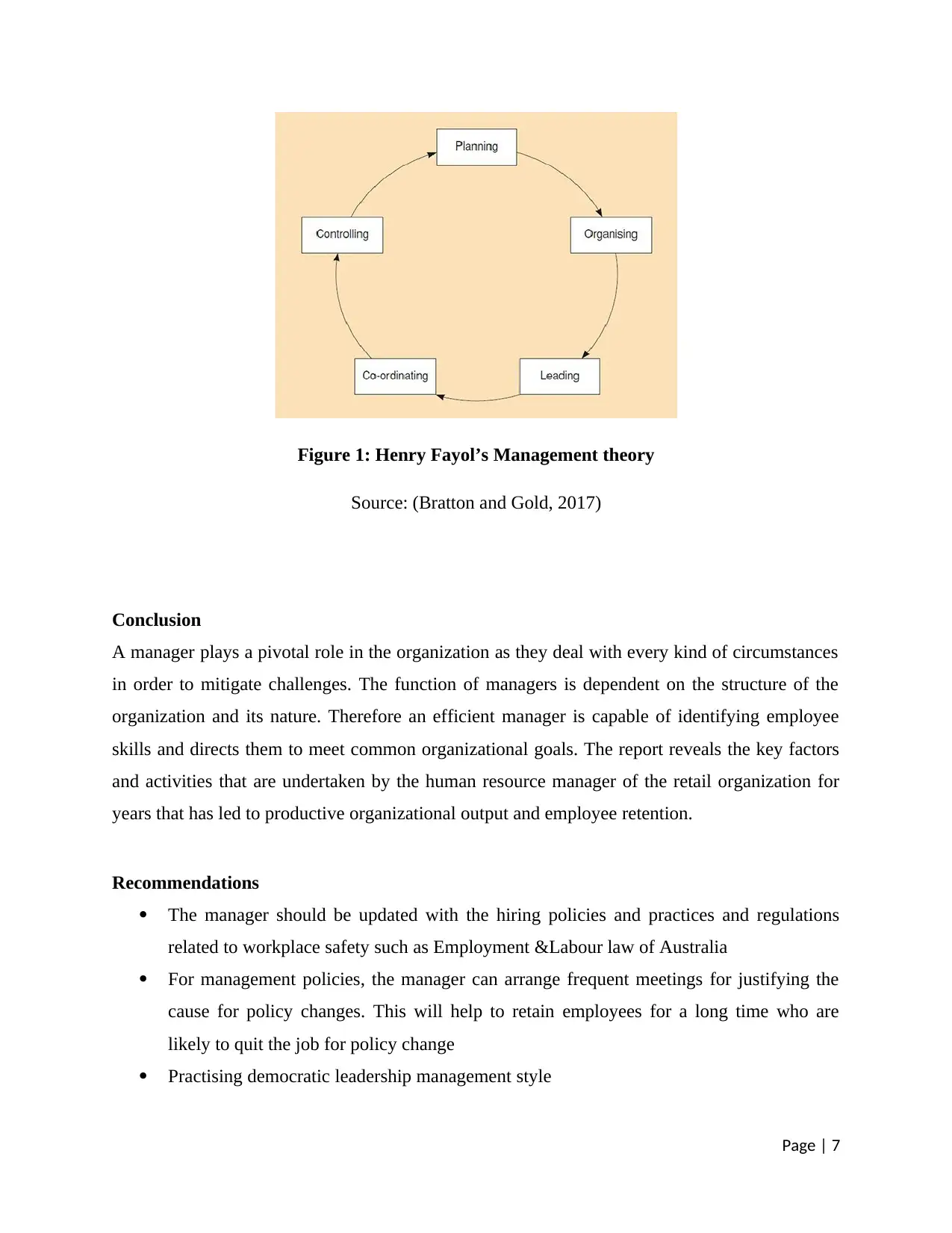
Figure 1: Henry Fayol’s Management theory
Source: (Bratton and Gold, 2017)
Conclusion
A manager plays a pivotal role in the organization as they deal with every kind of circumstances
in order to mitigate challenges. The function of managers is dependent on the structure of the
organization and its nature. Therefore an efficient manager is capable of identifying employee
skills and directs them to meet common organizational goals. The report reveals the key factors
and activities that are undertaken by the human resource manager of the retail organization for
years that has led to productive organizational output and employee retention.
Recommendations
The manager should be updated with the hiring policies and practices and regulations
related to workplace safety such as Employment &Labour law of Australia
For management policies, the manager can arrange frequent meetings for justifying the
cause for policy changes. This will help to retain employees for a long time who are
likely to quit the job for policy change
Practising democratic leadership management style
Page | 7
Source: (Bratton and Gold, 2017)
Conclusion
A manager plays a pivotal role in the organization as they deal with every kind of circumstances
in order to mitigate challenges. The function of managers is dependent on the structure of the
organization and its nature. Therefore an efficient manager is capable of identifying employee
skills and directs them to meet common organizational goals. The report reveals the key factors
and activities that are undertaken by the human resource manager of the retail organization for
years that has led to productive organizational output and employee retention.
Recommendations
The manager should be updated with the hiring policies and practices and regulations
related to workplace safety such as Employment &Labour law of Australia
For management policies, the manager can arrange frequent meetings for justifying the
cause for policy changes. This will help to retain employees for a long time who are
likely to quit the job for policy change
Practising democratic leadership management style
Page | 7
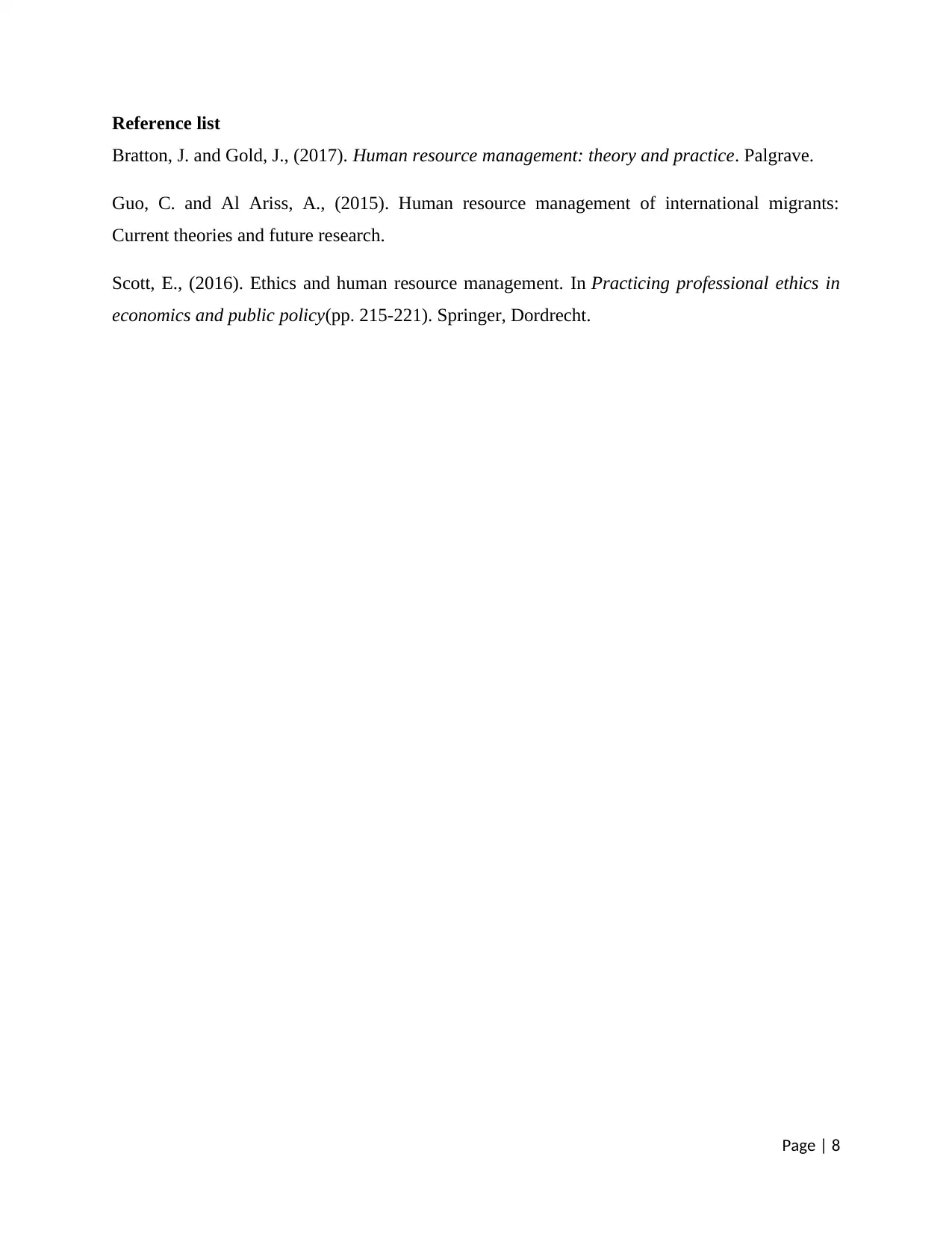
Reference list
Bratton, J. and Gold, J., (2017). Human resource management: theory and practice. Palgrave.
Guo, C. and Al Ariss, A., (2015). Human resource management of international migrants:
Current theories and future research.
Scott, E., (2016). Ethics and human resource management. In Practicing professional ethics in
economics and public policy(pp. 215-221). Springer, Dordrecht.
Page | 8
Bratton, J. and Gold, J., (2017). Human resource management: theory and practice. Palgrave.
Guo, C. and Al Ariss, A., (2015). Human resource management of international migrants:
Current theories and future research.
Scott, E., (2016). Ethics and human resource management. In Practicing professional ethics in
economics and public policy(pp. 215-221). Springer, Dordrecht.
Page | 8
⊘ This is a preview!⊘
Do you want full access?
Subscribe today to unlock all pages.

Trusted by 1+ million students worldwide
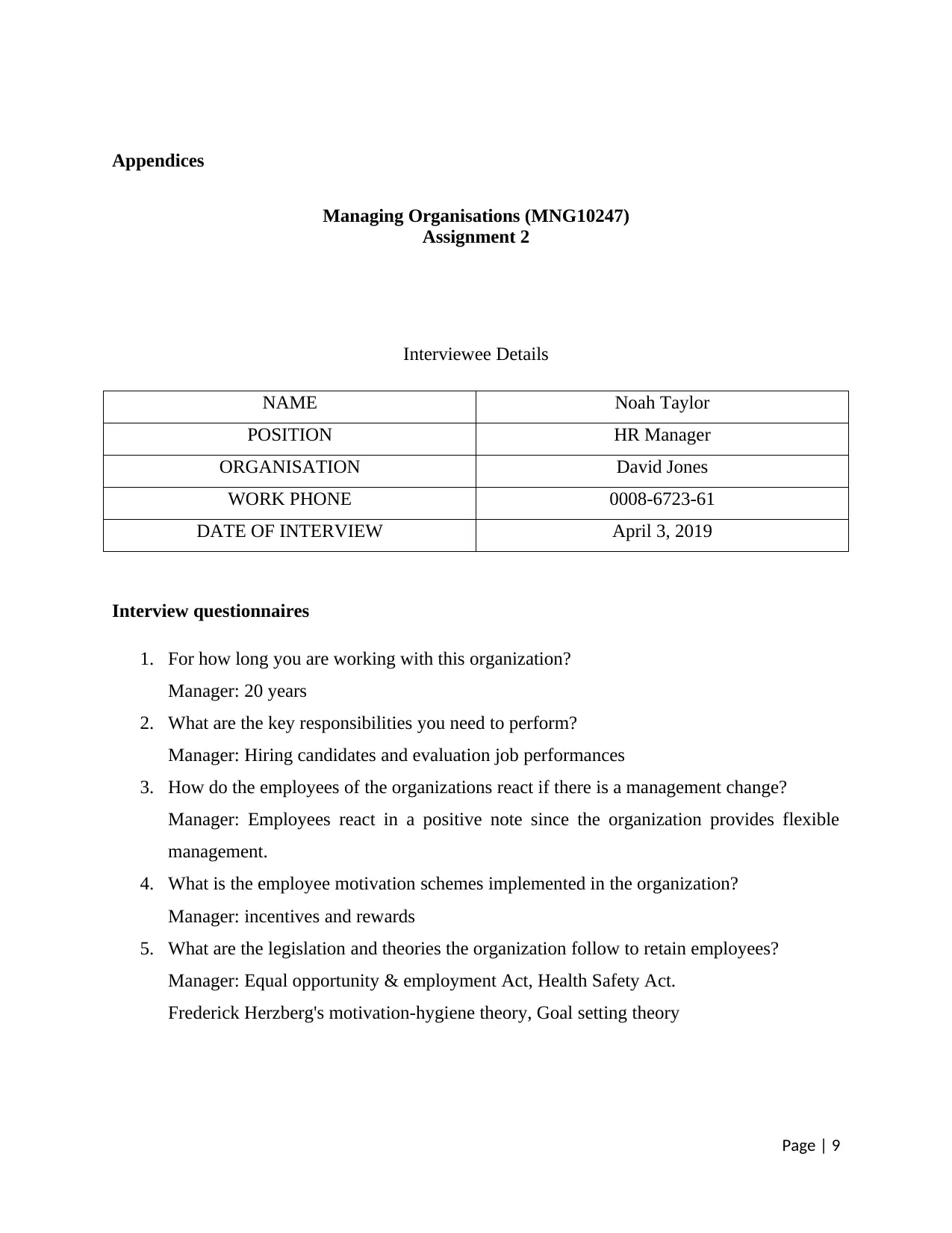
Appendices
Managing Organisations (MNG10247)
Assignment 2
Interviewee Details
NAME Noah Taylor
POSITION HR Manager
ORGANISATION David Jones
WORK PHONE 0008-6723-61
DATE OF INTERVIEW April 3, 2019
Interview questionnaires
1. For how long you are working with this organization?
Manager: 20 years
2. What are the key responsibilities you need to perform?
Manager: Hiring candidates and evaluation job performances
3. How do the employees of the organizations react if there is a management change?
Manager: Employees react in a positive note since the organization provides flexible
management.
4. What is the employee motivation schemes implemented in the organization?
Manager: incentives and rewards
5. What are the legislation and theories the organization follow to retain employees?
Manager: Equal opportunity & employment Act, Health Safety Act.
Frederick Herzberg's motivation-hygiene theory, Goal setting theory
Page | 9
Managing Organisations (MNG10247)
Assignment 2
Interviewee Details
NAME Noah Taylor
POSITION HR Manager
ORGANISATION David Jones
WORK PHONE 0008-6723-61
DATE OF INTERVIEW April 3, 2019
Interview questionnaires
1. For how long you are working with this organization?
Manager: 20 years
2. What are the key responsibilities you need to perform?
Manager: Hiring candidates and evaluation job performances
3. How do the employees of the organizations react if there is a management change?
Manager: Employees react in a positive note since the organization provides flexible
management.
4. What is the employee motivation schemes implemented in the organization?
Manager: incentives and rewards
5. What are the legislation and theories the organization follow to retain employees?
Manager: Equal opportunity & employment Act, Health Safety Act.
Frederick Herzberg's motivation-hygiene theory, Goal setting theory
Page | 9
1 out of 10
Related Documents
Your All-in-One AI-Powered Toolkit for Academic Success.
+13062052269
info@desklib.com
Available 24*7 on WhatsApp / Email
![[object Object]](/_next/static/media/star-bottom.7253800d.svg)
Unlock your academic potential
Copyright © 2020–2026 A2Z Services. All Rights Reserved. Developed and managed by ZUCOL.



